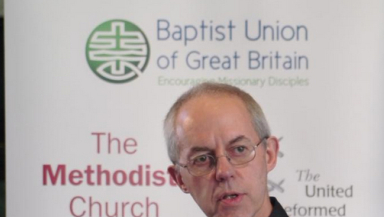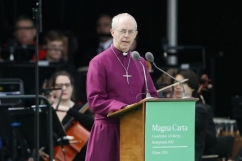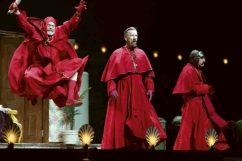
We all get annoyed with the Church at times. Either our local congregation or the whole institution. If it was up to us things would be different and better.
It's not just those inside the Church either. There are those outside who find themselves poorly treated or who simply want to be a critical friend and offer some suggestions for improvement.
These kinds of critique can be good. We need to be constantly looking to improve the way we serve people and honour our calling. In fact, as I wrote recently, we also need to heed voices of wisdom that come from outside the Church.
So in this spirit I read an article entitled, 'Is The Church Of England Fit For Purpose?' with interest. As an active member of the C of E, I was keen to see what we could do better.
The author, Casper ter Kuile, is someone whose work I've found interesting in the past. He makes some good points, but in some ways I feel he's failed to see the wood for the trees.
Let's leave aside the lack of nuance in the critique about the Church's treatment of minorities, ("absurd and cruel... a hateful force in society"). The main argument is that the Church is punching well below its weight – and needs to radically alter its vision.
"The Church no longer knows what it's for," says ter Kuile. He then goes on to list things the Church should be doing such as, "building community... and [helping us] make meaning in our lives".
If this sounds a bit like motherhood and apple pie, that doesn't make it invalid. He lists a number of people and organisations he feels are helping the Church fulfill these missions in a small way – whose work should be built upon. That sounds great.
I've got two concerns, though. Firstly, the Church exists primarily to worship and bear witness to Jesus. What follows on from this is a radical manifesto to change the world, but we never do the latter without the former.
To an extent, ter Kuile acknowledges this. "No doubt Anglican leaders would further point to the purpose being the worship of God," he says, "perhaps embodying the example of Jesus. Others might talk of mission, discipleship, and witness." But, he goes on, "The problem is, to most non-church goers, none of this means anything."
I agree, this terminology would sound like nonsense to many of my atheist friends. But that's not because it's inherently meaningless drivel. In fact, it's just 'insider language'. I don't know a single clergyperson who'd stand up on a Sunday (or indeed any other time of the week) and launch into a monologue about mission, discipleship and witness.
These are all helpful concepts to those of us who understand them and we shouldn't ditch them simply because they don't make sense to everyone. The task we have as a Church is to make these concepts meaningful in our lives and in the lives of our congregations – which then makes them attractional to those outside. If we are doing discipleship correctly, the Church will be an attractive place to be and the Christian life will be an attractive one to follow.

There is of course a problem that some churches do have with the way they're perceived – namely that they have become irrelevant to the average non-churchgoing person who prioritises a lie-in, time with the family or shopping instead of attending a church service. We need to hear the critique of being more relevant and important in the life of our communities. But we mustn't cut off the branch on which we sit.
What is it that makes churches unique? As Christians, we believe it is that we are the body of Christ. Churches are places where we worship the creator of the universe, where we celebrate the sacraments, where we sing together, bear each others burdens and live our lives in service to one another. This isn't merely another community association. We are the Bride of Christ.
What of the article's second critique? Despite highlighting some of the exciting projects he's aware of, the presumption is that the Church isn't actually doing much already to help in "building community" or helping people "make meaning in their lives". I'd argue that's exactly what lots and lots of churches are doing.
A small snapshot of the work of the Church of England (before we even get round to the wider Church of all denominations) would show some of the following:
- The Church has been at the forefront of the provision of food banks and other emergency food supplies. Hundreds of thousands of people across the country are reliant on these vital lifelines – the majority of which are provided by churches.

- The campaign against exploitative lending has been fought by churches, and since 2013 has been spearheaded by the Archbishop of Canterbury. We now have a cap on the total cost of credit in law for the first time in British history partially thanks to the Archbishop's initiative.
- The Church has played an important role in the growth of Credit Unions and other forms of ethical, local credit. Without support from the churches, this important but neglected area of the financial system would be less well-known and able to help fewer people. Churches also host credit unions, post offices and community shops in many places.
- The Living Wage campaign was begun in churches and other civil society groups in east London. Without the support of churches, it's doubtful that the campaign would ever have got off the ground. In the last 15 years, hundreds of millions of pounds has gone to people in low pay as a result.
- The Church has played a leading moral and practical role in the response to the refugee crisis. There are countless examples, large and small, of churches playing a key role in the response to the biggest social need of our generation.
Churches serve up to 10 million people a year with their social provision, churches have been found to be the most diverse institutions in the UK, churches are pioneering employments skills training, and homeless provision and helping small businesses start up and so on and so on.
Could we do more? Of course we could. We shouldn't be satisfied until the Kingdom comes and justice and mercy is seen in all the earth. However, we're doing a lot of amazing work that goes unreported, and without which the country would be a far, far worse place.
Ultimately I don't disagree that the Church should be doing all it can to build community and help people find meaning in their lives. However, we can only do more of that with more people coming through the doors. That will involve us continuing to worship, pray, evangelise and develop more ministries of social transformation and outreach. We're doing what we can. Those on the outside looking in should come and join us!
Follow Andy Walton on Twitter: @waltonandy















